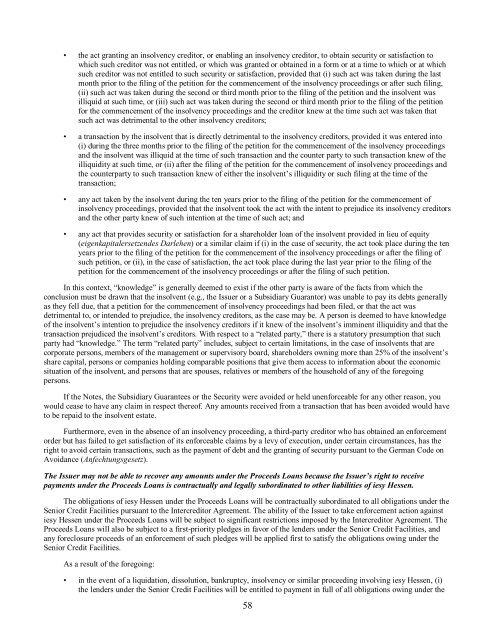iesy Repository GmbH - Irish Stock Exchange
iesy Repository GmbH - Irish Stock Exchange
iesy Repository GmbH - Irish Stock Exchange
Create successful ePaper yourself
Turn your PDF publications into a flip-book with our unique Google optimized e-Paper software.
• the act granting an insolvency creditor, or enabling an insolvency creditor, to obtain security or satisfaction to<br />
which such creditor was not entitled, or which was granted or obtained in a form or at a time to which or at which<br />
such creditor was not entitled to such security or satisfaction, provided that (i) such act was taken during the last<br />
month prior to the filing of the petition for the commencement of the insolvency proceedings or after such filing,<br />
(ii) such act was taken during the second or third month prior to the filing of the petition and the insolvent was<br />
illiquid at such time, or (iii) such act was taken during the second or third month prior to the filing of the petition<br />
for the commencement of the insolvency proceedings and the creditor knew at the time such act was taken that<br />
such act was detrimental to the other insolvency creditors;<br />
• a transaction by the insolvent that is directly detrimental to the insolvency creditors, provided it was entered into<br />
(i) during the three months prior to the filing of the petition for the commencement of the insolvency proceedings<br />
and the insolvent was illiquid at the time of such transaction and the counter party to such transaction knew of the<br />
illiquidity at such time, or (ii) after the filing of the petition for the commencement of insolvency proceedings and<br />
the counterparty to such transaction knew of either the insolvent’s illiquidity or such filing at the time of the<br />
transaction;<br />
• any act taken by the insolvent during the ten years prior to the filing of the petition for the commencement of<br />
insolvency proceedings, provided that the insolvent took the act with the intent to prejudice its insolvency creditors<br />
and the other party knew of such intention at the time of such act; and<br />
• any act that provides security or satisfaction for a shareholder loan of the insolvent provided in lieu of equity<br />
(eigenkapitalersetzendes Darlehen) or a similar claim if (i) in the case of security, the act took place during the ten<br />
years prior to the filing of the petition for the commencement of the insolvency proceedings or after the filing of<br />
such petition, or (ii), in the case of satisfaction, the act took place during the last year prior to the filing of the<br />
petition for the commencement of the insolvency proceedings or after the filing of such petition.<br />
In this context, “knowledge” is generally deemed to exist if the other party is aware of the facts from which the<br />
conclusion must be drawn that the insolvent (e.g., the Issuer or a Subsidiary Guarantor) was unable to pay its debts generally<br />
as they fell due, that a petition for the commencement of insolvency proceedings had been filed, or that the act was<br />
detrimental to, or intended to prejudice, the insolvency creditors, as the case may be. A person is deemed to have knowledge<br />
of the insolvent’s intention to prejudice the insolvency creditors if it knew of the insolvent’s imminent illiquidity and that the<br />
transaction prejudiced the insolvent’s creditors. With respect to a “related party,” there is a statutory presumption that such<br />
party had “knowledge.” The term “related party” includes, subject to certain limitations, in the case of insolvents that are<br />
corporate persons, members of the management or supervisory board, shareholders owning more than 25% of the insolvent’s<br />
share capital, persons or companies holding comparable positions that give them access to information about the economic<br />
situation of the insolvent, and persons that are spouses, relatives or members of the household of any of the foregoing<br />
persons.<br />
If the Notes, the Subsidiary Guarantees or the Security were avoided or held unenforceable for any other reason, you<br />
would cease to have any claim in respect thereof. Any amounts received from a transaction that has been avoided would have<br />
to be repaid to the insolvent estate.<br />
Furthermore, even in the absence of an insolvency proceeding, a third-party creditor who has obtained an enforcement<br />
order but has failed to get satisfaction of its enforceable claims by a levy of execution, under certain circumstances, has the<br />
right to avoid certain transactions, such as the payment of debt and the granting of security pursuant to the German Code on<br />
Avoidance (Anfechtungsgesetz).<br />
The Issuer may not be able to recover any amounts under the Proceeds Loans because the Issuer’s right to receive<br />
payments under the Proceeds Loans is contractually and legally subordinated to other liabilities of <strong>iesy</strong> Hessen.<br />
The obligations of <strong>iesy</strong> Hessen under the Proceeds Loans will be contractually subordinated to all obligations under the<br />
Senior Credit Facilities pursuant to the Intercreditor Agreement. The ability of the Issuer to take enforcement action against<br />
<strong>iesy</strong> Hessen under the Proceeds Loans will be subject to significant restrictions imposed by the Intercreditor Agreement. The<br />
Proceeds Loans will also be subject to a first-priority pledges in favor of the lenders under the Senior Credit Facilities, and<br />
any foreclosure proceeds of an enforcement of such pledges will be applied first to satisfy the obligations owing under the<br />
Senior Credit Facilities.<br />
As a result of the foregoing:<br />
• in the event of a liquidation, dissolution, bankruptcy, insolvency or similar proceeding involving <strong>iesy</strong> Hessen, (i)<br />
the lenders under the Senior Credit Facilities will be entitled to payment in full of all obligations owing under the<br />
58

















